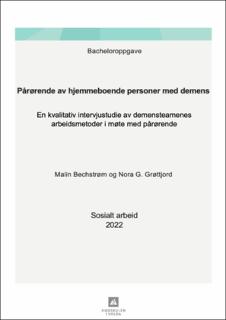| dc.contributor.author | Bechstrøm, Malin | |
| dc.contributor.author | Grøttjord, Nora G. | |
| dc.date.accessioned | 2022-07-21T12:46:11Z | |
| dc.date.available | 2022-07-21T12:46:11Z | |
| dc.date.issued | 2022 | |
| dc.identifier.uri | https://hdl.handle.net/11250/3007536 | |
| dc.description.abstract | Demensteam i kommunene har som oppgave å utrede og oppfølge personer av demens, samtidig har de også som ansvar for å veilede pårørende. I årene fremover og allerede nå er den såkalte eldrebølgen i gang, noe som legger stort press på omsorgstjenestene. Flere eldre vil bety flere personer med demens, men også enda flere pårørende. Vi undersøker derfor i dette prosjektet hvordan demensteam arbeider for å ivareta og veilede pårørende av hjemmeboende personer med demens. Utgangspunktet for studien er omsorgsbelastningen pårørende får som følge av omsorgsrollen de står i. For å finne ut av hvordan demensteamene jobber for at pårørende skal føle seg trygge i den «ufrivillige» rollen de får som pårørende, er vår problemstilling:
Hvordan arbeider demensteam for å ivareta og veilede de pårørende av hjemmeboende personer med demens?
For å besvare problemstillingen har vi benyttet oss av teoriene: Söderlund sin erfaringsmodell «å forstå pårørende», Maslows behovspyramide, psykoedukasjon og sosialt nettverk på ulike nivå. Studien er et kvalitativt studium som undersøker hvordan demensteam i småkommuner organiserer og utfører pårørendearbeid gjennom et fenomenologisk-hermeneutisk perspektiv.
Vi hevder derfor at oppgaven kan bidra til økt forståelse og bevissthet rundt arbeid med pårørende i årene fremover, med tanke på eldrebølgen. Funnene viser også til at demensteamene ikke opplever å ha tilstrekkelig med ressurser som tid og tilstrekkelig kompetanse.
Nøkkelord: demens, pårørende, demensteam, relasjon, omsorgsbelastning, veiledning. | en_US |
| dc.description.abstract | | en_US |
| dc.description.abstract | Abstract
Care teams across the municipalities of Norway are tasked with the assessment and follow-up of people with dementia. In addition to patient care, they are also responsible for guiding next-of-kin. The so-called age wave is advancing, with increasing life expectancy, putting excessive pressure on care services. Greater numbers of elderly people will cause an increase in dementia patients, resulting in more next-of-kin. This thesis will therefore investigate how care teams endeavour to assist the of next-of-kin of people living at home with dementia. The motivation for this work is the care burden among next-of-kin, caused by the care role they are in. To identify how the care teams work to make next-of-kin feel safe in the “involuntary” role they find themselves in, our research question is:
How do care teams work to care for and guide the next-of-kin of people living at home with dementia?
To answer the problem, we have used several theories including: Söderlund’s experience model “to understand next-of-kin”, Maslow’s hierarchy of needs, psychoeducation, and social networks on various levels. This thesis conducts a qualitative study that examines how care teams in small municipalities organise and work with next-of-kin through a phenomenological-hermeneutic perspective.
We therefore claim that this thesis can contribute to increased understanding and awareness of work with next-of-kin in the years ahead, when challenged with the advancing age wave. The findings also indicate that care teams do not feel they have sufficient resources, such as time and sufficient expertise.
Keywords: dementia, next-of-kin, care team, relationship, care burden, guidance. | en_US |
| dc.language.iso | nob | en_US |
| dc.publisher | Høgskulen i Volda | en_US |
| dc.subject | demens | en_US |
| dc.subject | demensteam | en_US |
| dc.subject | pårørende | en_US |
| dc.subject | relasjon | en_US |
| dc.subject | omsorgsbelastning | en_US |
| dc.subject | veiledning | en_US |
| dc.title | Pårørende av hjemmeboende personer med demens. En kvalitativ intervjustudie av demensteamenes arbeidsmetoder i møte med pårørende | en_US |
| dc.type | Bachelor thesis | en_US |
| dc.source.pagenumber | 35 | en_US |
